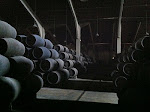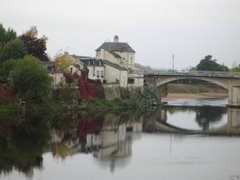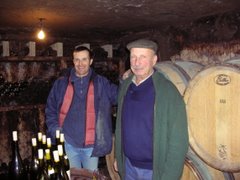How Long Should a Wine Age?
I've always been attracted to things that are defined by a concrete set of rules. What attracts me most is when, given a thorough understanding of the rules, it is possible to be creative in solving problems within that system. Chess, baseball, music, poker...these are some of the things I'm talking about.
Wine fits in here too. There are plenty of rules one can use in understanding the universe of wine - places, grape varieties allowed, methods of elevage, and so on. There are people out there, you've probably met them too, whose appreciation of wine seems to derive from an elevated level of scholarship - they treat it like a science. And that's fine. But there is loads of room for creativity too. How long a wine should age, for example - I've been thinking for a while now about this problem, and to me the answers involve creativity, not a set of rules.
Vouvray sec - 8 years
Vouvray demi-sec - 14 years
Anything by Huet or Foreau - 23 years
And so on...
Obviously the vagaries of vintage quality, producer quality, terroir quality, vine age, wine making technique, and countless others make it impossible to make such a list.
Yet, you have, if not a list, something in your mind that guides your hand when making decisions about aging wine. How did you form your set of rules? I am still in the process of forming mine. I began by reading and talking to friends, and this definitely served me well. But I'm committed now to experimenting for myself, building my knowledge through trial and error and through the generosity of others. After all, my preferences might not be the same as yours, so just because you say that Fourrier's wines need at least 10 years in a typical vintage, shouldn't I try to find out for myself?
And take a step back for a moment - what does it even mean to say "needs at least 10 years?" Needs 10 years in order to be what, exactly? Ready to drink? Fully mature? Less tannic and in a better state of balance? I read statements like "needs at least 10 years" all the time, and it's not that I think that they're wrong, bad, or silly. But I read them and can accept them as truth, and yet I sometimes have no idea what they're referring to - I've never had a 10 year old Fourrier, for example.
How often do you drink old/mature wine? Unless you often buy at auction, or have been buying and cellaring wine for a very long time, you're probably like me - you drink scores of younger wines for every truly mature bottle you drink.
Hmmm, the 12 year rule. I know I began by saying that the answer involves creativity, not rules. But Peter was suggesting 12 years as a guideline to use when in doubt, and he meant that the drinker should evaluate the wine at that point and determine whether or not it requires further time.
But what about good villages wines, does the 12 year rule apply to them as well? I asked him this recently and he said that the reasoning behind the 12 year rule is the fact that most good Burgundy wine can be quite drinkable in its youth but then a few years out from the vintage it shuts down and becomes quite closed. At 12 years, give or take, it emerges as a mature wine. With villages wine, it might not take 12 years. With great wine in a vintage like 2004, it might not require 12 years. In a high-acid vintage like 1999, it might take more than 12 years for a great wine to mellow and show at its best. So that one bottle of 1999 Lafarge Clos des Chênes I have, I'm going to give it a few years past 2011. In 2009 Peter and I drank a bottle of 1995 Mugneret-Gibourg Echezeaux and it was good, but the wine wasn't fully resolved - the structure was still too prominent, and we both felt that with a few more years it would have shown better. But in 2009 we also drank a bottle of 1995 Chandon de Briailles Corton Clos du Roi and it was a thing of beauty, in a perfect place. Again, even when trying to apply the 12 year rule, the answers require creativity.
Last week in San Diego I had the chance, thanks to the generosity of my father-in-law, to drink a few old wines and I learned a tremendous amount from them. I already told you about the 1986 Margaux, but on another night we drank a 1988 Château Léoville Las Cases and it was superb, I preferred it to the Margaux. It was full of tobacco and leather, the only fruit really was a bit of dark cassis on the finish. There was a tactile texture to the wine and the acidity was still vibrant - the wine was nowhere near tired, it was very much fresh and alive. If I had more of this I would drink it now, it's delicious and what would I be waiting for? So my new rule - good Bordeaux needs exactly 22 years. A joke, friends, a joke. But really, I learned that good old Bordeaux is really good wine, and perhaps it isn't made the same way it was in the '80's and before that, but it's too easy to write off Bordeaux as spoof-city over-priced silliness. My guess is that it once was a great thing.
And how about this - on our last night we drank a 1977 Ruffino Chianti Classico Riserva Ducale. Pop-pop brought this wine back from Italy a long time ago. I know nothing about Chianti, and my association with Ruffino wasn't great. But I loved this wine, loved it. So leathery and earthy, but with lots of sour cherry too, and all of the aromas and flavors were crystal clear. There was still structure too, and good acidity. And the finish was glorious, this unending wash of cherry and leather fragrance. So, what would happen if I aged a bottle of the 2007 Pian del Ciampolo for 33 years? My guess is it would be awesome. Or maybe it would be tired and brown. Who knows.
I hope I have the patience to cellar wines for decades like this. The rewards can be so great.







11 comments:
I know it is very trendy to knock Bordeaux these days but that is just silly. There are also brilliant wines from Bordeaux that have made since 1988. Through the 90's and 2000's.... I imagine that those wines will follow a similiar aging path as the wines of the 80's and earlier. Perhaps even better.
I'm in agreement with you about Bordeaux, mostly its spoof city when young- and the wines made in the last decade will be hard to age I think, but the good ones from the 80s and early 90s are great wines . . . Patience is the key, and buying lots and lots of wine from auctions!
I have developed a taste for wine over the last four year and have only just begun to consider buying en-primeur or by the case as soon as available at wine merchants. last week I purchased my most expensive bottle so far...a '99 Batailley (after hopping off a bus in terrible traffic on Oxford Street). it cost £35 but the I believe it was well worth it- turning brownish on the edge, it was still very fruity on the nose and an absolute fruit bomb..lead pencil, leather, "agbalumo" (this is a tropical fruit found in Nigeria) and I just hope my wallet would permit me to continue on this wonderful voyage of discovery. thanks for the wonderful posts a ver good read.
Samuel (Berkshire, UK)
I hope you'll excuse me for shilling my own wines on here, but Rosenthal's small portfolio of Bordeaux really stands apart from the mire of most present-day ink from the region. If you're not familiar with these, we should drink some together soon. There are scant few sources for Bordeaux as classical, restrained, and stately as these.
Hmmm, lots to ponder here. I don't think anyone can say Fourrier needs ten years. That would be odd, given the new regime. But I was lucky enough to try one recently, and I know it will shock you that it was beautiful. I am surprised that you describe 1999 in Burgundy as a high acid year -- not the first term that comes to mind for me.
p.s. [feel free to merge], I completely agree both about the general spoofedness of Bordeaux and Rosenthal's presenting us a small oasis of real wines.
Clarke - hit me - let's drink them.
Cliff - i guess i shouldn't have said it that way because it makes me sound like I know, and i don't. how would you describe 99?
Vintage generalities being what they are, I'd try to duck and cover.... But, having entered the fray, I think of 1999 as a ripe year, not as flabby by any stretch -- I'm not talking 1997 -- but more "hedonistic" or fulsome than, say 2001, 1998, or 1996, for exampme.
Those old Ruffinos are a marvel. I had dinner at Tommaso's for my birthday this past fall, and amid a slew of rare and fantastic wines (my first Soldera and first Giacosa were highlights, as well as a Bollinger Vieilles Francaises ) Tommaso brought us a 1971 Ruffino, the same cuvee as your 77. He poured it for us blind and told us it was Burgundy and as we were all suitably toasted at this point we oohed and aahed at the wine in the glass until he showed us the label, at which point our jaws hit the floor. A stupendous bottle.
I had a slew of the 82 Le Pergole Torte and would drink a bottle every couple of years, from 1990 until 2005. As the wine aged it changed from a bright fruit and tannin aspect to a leathery, mellow, almost creamy character. The tannins softened, the wine become not more interesting but different. As a young wine I loved it, as it aged, I still loved it, but it was kind of like one's parents. A different approach to something one has known for a long time. It was a very enjoyable experience. I am having that not with thew 1985 La Chapelle Hermitage from Paul Jaboulet.
A great post!
I was searching for a long-time this type of all-in-one information, but couldn't find.
Thanks a lot.
Post a Comment